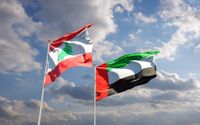The United Arab Emirates has officially lifted a three-year travel ban on its citizens traveling to Lebanon, a significant move aimed at strengthening ties between the two nations. This announcement came following a meeting between UAE President Sheikh Mohamed bin Zayed and Lebanese President Joseph Aoun in Abu Dhabi on April 30, 2025. The two leaders discussed various avenues to enhance cooperation and bolster bilateral relations during this pivotal visit.
According to a joint statement released by the Emirates News Agency (WAM), the two sides agreed to implement necessary procedures and mechanisms to facilitate travel between the UAE and Lebanon. The statement emphasized the commitment of both countries to deepen their fraternal relations and to support each other's security and stability.
President Sheikh Mohamed expressed his eagerness to work collaboratively with Lebanon to promote development, prosperity, and regional stability. He underscored the UAE’s ongoing support for Lebanon’s sovereignty and security, reinforcing the importance of Lebanon within the Arab world. “His Highness Sheikh Mohamed expressed his keenness to work jointly with Lebanon to foster development, prosperity, security, and regional stability,” the statement noted.
In response, President Aoun conveyed his gratitude to Sheikh Mohamed for his supportive stance towards Lebanon and its people, affirming his intention to continue strengthening bilateral relations. Aoun, who took office in January 2025 after a prolonged presidential vacuum, highlighted the significance of this visit in reinforcing the bond between the two nations.
The joint statement outlined several concrete steps to enhance cooperation, including the establishment of a joint UAE-Lebanon Business Council. Additionally, the Abu Dhabi Fund for Development will send a delegation to Lebanon to explore and assess potential joint cooperation projects, further solidifying economic ties.
Moreover, the Government Experience Exchange Office of the UAE’s Ministry of Cabinet Affairs is set to visit Beirut to share best practices in government performance and institutional excellence. This initiative aims to benefit both the public and private sectors in both countries.
Historically, the UAE had imposed a travel ban on its citizens in 2021, withdrawing its diplomats from Beirut in solidarity with Saudi Arabia after a Lebanese minister criticized Riyadh's military intervention in Yemen. While Lebanese citizens were not banned from traveling to the UAE, they faced challenges in obtaining visas. The lifting of this travel ban signifies a thaw in relations, as the UAE seeks to strengthen its ties with Lebanon amidst ongoing regional developments.
The resumption of diplomatic activities by the UAE Embassy in Beirut, which officially reopened on January 24, 2025, marked a significant turning point after a three-year hiatus. This reopening followed a high-ranking Emirati delegation's visit to Lebanon to facilitate arrangements for the embassy's reestablishment, reflecting the UAE's commitment to re-engage with Lebanon.
As the two countries work to enhance their cooperation, they are also navigating the complex landscape of regional politics. The recent meeting between President Aoun and Saudi Arabia's Crown Prince Mohammed Bin Salman highlighted ongoing efforts to improve relations between Lebanon and its Gulf neighbors. In March 2025, Saudi Arabia announced plans to review obstacles to resuming Lebanese imports and lifting a ban on its nationals visiting Lebanon, signaling a broader regional effort to stabilize relations.
This latest agreement between the UAE and Lebanon comes at a critical time, as both nations seek to bolster their economies and enhance regional security. The commitment to allow travel for citizens is a vital step towards fostering closer ties and promoting mutual interests.
In addition to travel facilitation, the discussions between Sheikh Mohamed and Aoun also encompassed the impact of regional developments on Arab-Arab relations and security. President Sheikh Mohamed reaffirmed Lebanon’s strategic importance within the Arab world, highlighting its role as a key pillar of joint Arab action.
As the UAE and Lebanon embark on this renewed chapter of cooperation, the emphasis on economic development, governance, and mutual support stands at the forefront of their agenda. The establishment of a joint business council and the sharing of best practices in governance are expected to yield significant benefits for both countries.
The lifting of the travel ban is not merely a logistical change; it symbolizes a broader commitment to rebuilding trust and cooperation in a region that has faced numerous challenges. As both nations navigate the complexities of their geopolitical landscape, this agreement marks a hopeful step towards a more integrated and prosperous future.
In conclusion, the UAE's decision to lift the travel ban on Lebanon reflects a significant thaw in relations and a commitment to enhancing bilateral cooperation across various sectors. As both nations look to the future, their shared aspirations for stability, security, and economic prosperity will guide their collaborative efforts.





